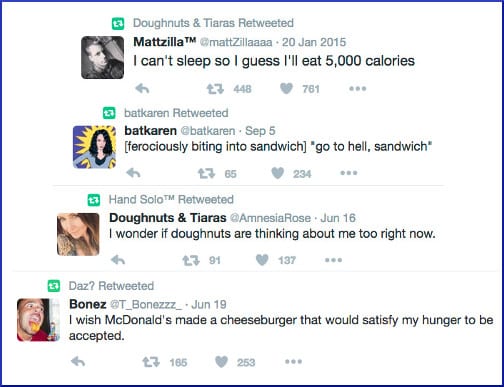
Elizabeth S. Bast and Elliot M. Berry studied the relationships between obesity and the “hypothesized mechanisms” of emotional eating, and combined that knowledge with research to suggest that…
[…] the role of humor as a possible tool for aiding those in whom emotions, particularly negative ones, trigger eating as a means to improve mood. We then review the field of therapeutic humor and its ability to de-stress individuals, possibly through endorphin and opioid systems, both of which are also involved in eating behavior.
What they are getting at is the possibly that people could use humor as a “food substitute” — that humor can somehow serve as a no-calorie replacement for chocolate-covered bacon.
They call it a “novel hypothesis,” but it isn’t. Hippocrates said, “Let food be thy medicine,” and the Bible’s Book of Proverbs said, “He that is of a merry heart has a continual feast.” An old Jewish proverb said, “As soap is to the body, so laughter is to the soul.” Lord Byron called laughter “a cheap medicine” and Henry Ward Beecher called it “God’s medicine.”
The idea that food and laughter are equally capable of providing nourishment and curative power is an old one. In more recent times, Madeleine L’Engle said, “A good laugh heals a lot of hurts,” and Fred Allen uttered the seemingly cryptic but very telling formula, “It is bad to suppress laughter. It goes back down and spreads to your hips.”
The authors of this paper sum it all up by saying:
We propose that the phenomenon of emotional eating and the therapeutic potential of humor overlap in the domain of stress activity and management.
Anyone who wants to study something like this first needs to sort out the emotional eaters from the normal and restrained eaters, and there are tests for that. Emotional eaters, not surprisingly, are into hyperpalatable foods with plenty of sugar and fat, and share the traits of hope and expectancy that life will seem better if these things are consumed. One of the interesting things researchers have discovered is that the dynamic can work the other way — when people experience positive emotions they actually tend to eat more healthful foods.
The connection between mood and carbohydrate intake has been studied, and the connection between mood and protein intake. What with one thing and another, looking for nutrient-dependent effects has not been satisfactory.
Studies have shown that eating really doesn’t reduce a person’s stress level, although we live in perpetual hope that it will make a difference. Actually, comfort eating has been shown to make a negative difference, because guilt makes the person feel even more depressed.
Emotional eating is a maladaptive response, while research has shown that…
[…] mirthful laughter decreases serum levels of cortisol, epinephrine, growth hormone, and 3,4-dihydrophenylacetic acid (a major dopamine catabolite), indicating a reversal of the “stress response.”
Needless to say, reversal of the stress response is exactly what we are looking for in these situations. The notion that humor therapy can actually do what emotional eating pretends to do is an attractive one. Research has shown that laughter is an effective stress-reduction coping mechanism, with cardiovascular benefits, analgesic effects, and immune system improvements.
When a treatment can help a patient feel better without negative side effects, what’s not to like? But work needs to be done, however, because…
[…] many of these studies have methodological problems, and further research is required in all areas to develop a fuller understanding of the effects of humor on health.
Your responses and feedback are welcome!
Source: “Laugh Away the Fat? Therapeutic Humor in the Control of Stress-induced Emotional Eating,” RMMJ.org, January 2014
Images by (top to bottom): @mattZillaaaa, @batkaren, @AmnesiaRose, @T_Bonezzz_ (Twitter)

 FAQs and Media Requests:
FAQs and Media Requests: 











